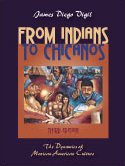“I have decided to use Vigil’s interpretation of change for my introductory Chicano studies class since it provides a clear and basic framework for understanding the complexities of the Chicano identity.” — Mike Fraga, California State University, Carson
“Wonderful chronology! Vigil offers solid and critical analysis of the persistent issues that plague our communities.” — Ramon del Castillo, Metropolitan State University of Denver
“Excellent postcolonial assessment of Mexican-American culture.” — Jill Kelly-Moore, Santa Rosa Junior College

349 pages, $51.95 list
1-57766-740-9
978-1-57766-740-7
© 2012
paperback
eBook availability
From Indians to Chicanos
The Dynamics of Mexican-American Culture
Third Edition
Anthropologist-historian James Diego Vigil distills an enormous amount of information to provide a perceptive ethnohistorical introduction to the Mexican-American experience in the United States. He uses brief, clear outlines of each stage of Mexican-American history, charting the culture change sequences in the Pre-Columbian, Spanish Colonial, Mexican Independence and Nationalism, and Anglo-American and Mexicanization periods. In a very understandable fashion, he analyzes events and the underlying conditions that affect them. Readers become fully engaged with the historical developments and the specific socioeconomic, sociocultural, and sociopsychological forces involved in the dynamics that shaped contemporary Chicano life.
Considered a pioneering achievement when first published, From Indians to Chicanos continues to offer readers an informed and penetrating approach to the history of Chicano development. The richly illustrated Third Edition incorporates data from the latest literature. Moreover, a new chapter updates discussions of immigration, institutional discrimination, the Mexicanization of the Chicano population, and issues of gender, labor, and education.
Considered a pioneering achievement when first published, From Indians to Chicanos continues to offer readers an informed and penetrating approach to the history of Chicano development. The richly illustrated Third Edition incorporates data from the latest literature. Moreover, a new chapter updates discussions of immigration, institutional discrimination, the Mexicanization of the Chicano population, and issues of gender, labor, and education.
Reactions
Introduction
Why a Dynamic History? / Macrohistorical Evolution and the Six C's Model of Culture Change / Theoretical Implications for the Present Day
Stage I: PRE-COLUMBIAN PERIOD—30,000 BC–AD 1519
1. Human Evolution in Mesoamerica
Ecological Adaptation / Agricultural Revolution / Refinement of Sociocultural Life / Olmecs—Mother Culture / Chichimecas—Migration from Aztlan
2. Intact and Stable Social Order
Class: Nobility Supported by Commoners / Culture: Pantheon of Gods, Moral Order, and Literary Tradition / Color: Intragroup Racism
3. Breakup and Transformation of the Social Order
Contact: Conquerors Seek Riches / Conflict: Destruction of Tenochtitlan / Change: Colonial Practices Begin
Stage II: SPANISH COLONIAL ERA—1521–1281
4. Intact and Stable Social Order
Class: Haciendas and Debt Peons / Culture: Hispanicization and Mestizaje / Color: Roots of Racism and Racial Barriers
5. Breakup and Transformation of the Social Order
Contact: Enlightenment / Conflict: Independence / Change: Experimentation and Nationalism
Stage III: MEXICAN INDEPENDENCE AND NATIONALISM—1821–1846
6. Intact and Stable Social Order
Class: Ideological Struggle between Liberals and Conservatives / Culture: Budding Mexicanismo / Color: Mestizaje and Lingering Racism
7. Breakup and Transformation of the Social Order
Contact: Anglo-American Expansionism / Conflict: End of the Mexican–American War, Continuation of Strife / Change: New System for Mexican Americans
Stage IV: ANGLO-AMERICAN AND MEXICANIZATION PERIOD—1846–Present
8. Intact and Stable Social Order
Class: Industrialism and Urbanization / Culture: Assimilation vs. Nativist Acculturation / Color: Inter- and Intragroup Racism
9. Breakup and Transformation of the Social Order
Contact: Civil Rights Ferment / Conflict: 1960s Chicano Movement / Change: 1970s and Beyond
10. A Postscript to the Anglo-American and Mexicanization Period: The Three C's
Class / Culture / Color: Persistence Generates New Ways to Dissect Race
Conclusion: The Chicano Legacy
The Intersection of History and Culture Change
Why a Dynamic History? / Macrohistorical Evolution and the Six C's Model of Culture Change / Theoretical Implications for the Present Day
Stage I: PRE-COLUMBIAN PERIOD—30,000 BC–AD 1519
1. Human Evolution in Mesoamerica
Ecological Adaptation / Agricultural Revolution / Refinement of Sociocultural Life / Olmecs—Mother Culture / Chichimecas—Migration from Aztlan
2. Intact and Stable Social Order
Class: Nobility Supported by Commoners / Culture: Pantheon of Gods, Moral Order, and Literary Tradition / Color: Intragroup Racism
3. Breakup and Transformation of the Social Order
Contact: Conquerors Seek Riches / Conflict: Destruction of Tenochtitlan / Change: Colonial Practices Begin
Stage II: SPANISH COLONIAL ERA—1521–1281
4. Intact and Stable Social Order
Class: Haciendas and Debt Peons / Culture: Hispanicization and Mestizaje / Color: Roots of Racism and Racial Barriers
5. Breakup and Transformation of the Social Order
Contact: Enlightenment / Conflict: Independence / Change: Experimentation and Nationalism
Stage III: MEXICAN INDEPENDENCE AND NATIONALISM—1821–1846
6. Intact and Stable Social Order
Class: Ideological Struggle between Liberals and Conservatives / Culture: Budding Mexicanismo / Color: Mestizaje and Lingering Racism
7. Breakup and Transformation of the Social Order
Contact: Anglo-American Expansionism / Conflict: End of the Mexican–American War, Continuation of Strife / Change: New System for Mexican Americans
Stage IV: ANGLO-AMERICAN AND MEXICANIZATION PERIOD—1846–Present
8. Intact and Stable Social Order
Class: Industrialism and Urbanization / Culture: Assimilation vs. Nativist Acculturation / Color: Inter- and Intragroup Racism
9. Breakup and Transformation of the Social Order
Contact: Civil Rights Ferment / Conflict: 1960s Chicano Movement / Change: 1970s and Beyond
10. A Postscript to the Anglo-American and Mexicanization Period: The Three C's
Class / Culture / Color: Persistence Generates New Ways to Dissect Race
Conclusion: The Chicano Legacy
The Intersection of History and Culture Change